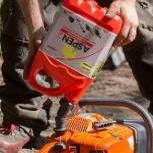1) What is the life cycle analysis energy input into producing this fuel ?
About 67 to 80 % of the energy in, in the form of natural gas or flare gas becomes products, e.c: Liquid, synthetic fuels, synthetic chemicals, steam and electricity. The alternative: These flare gases are flared instead means 100 % energy waste and 0 % energy efficiency.
2) What is its cetane and calorific value?
Cetane: About 55.
Calorific value per kg: 47 megajoules. Density: 0.80 kg/litre.
3) What is its flash point?
About 94 to 98 degrees C.
4) What level of lubricity does it have for fuel pump durability?
Extremely good lubricity. HFRR wear scar value of: 250 to 300 micrometres (µm).
What is it's overall net CO2 contribution?
a) If natural gas is used, there is a decrease in comparison to crude oil inclusive fossile CO2 emissions from gas flaring and fossile CO2 emissions from oil refining, is a fossile CO2 reduction of about 30 %.
b) If the flare gases are used for the synthesis of liquid, synthetic fuels, the decrease of fossile CO2 (in comparison to the gas flaring) is 65 to 80 % depending on how successfully you use the biproduct: heat/steam. If you flare gases, or first synthesise liquid fuels and combust them in a diesel engine gives exactly the same emissions of fossil CO2, BUT: You compete out certain volumes of crude oil based diesel oil with the liquid, synthetic fuel. That fact gives rise to decreasees of fossil CO2 emissions. By other simpler words:
When you stop wasting energy by e.g. gas flaring, and starts to use the energy in e.g. the gas flares, then you need to pump up less crude oil and gases per year. That fact gives rise to large fossile CO2 reductions. The potential is: A worldwide decrease of 250 to 400 million tonnes of fossile CO2 per year.
6) What is its fuel survivivor of CH4 (slippage) ratio in a variety of engines?
Liquid, synthetic, paraffinic fuels do NOT contain methane!!!!!!!
Nor will methane be formed during the combustion in the diesel engine.







